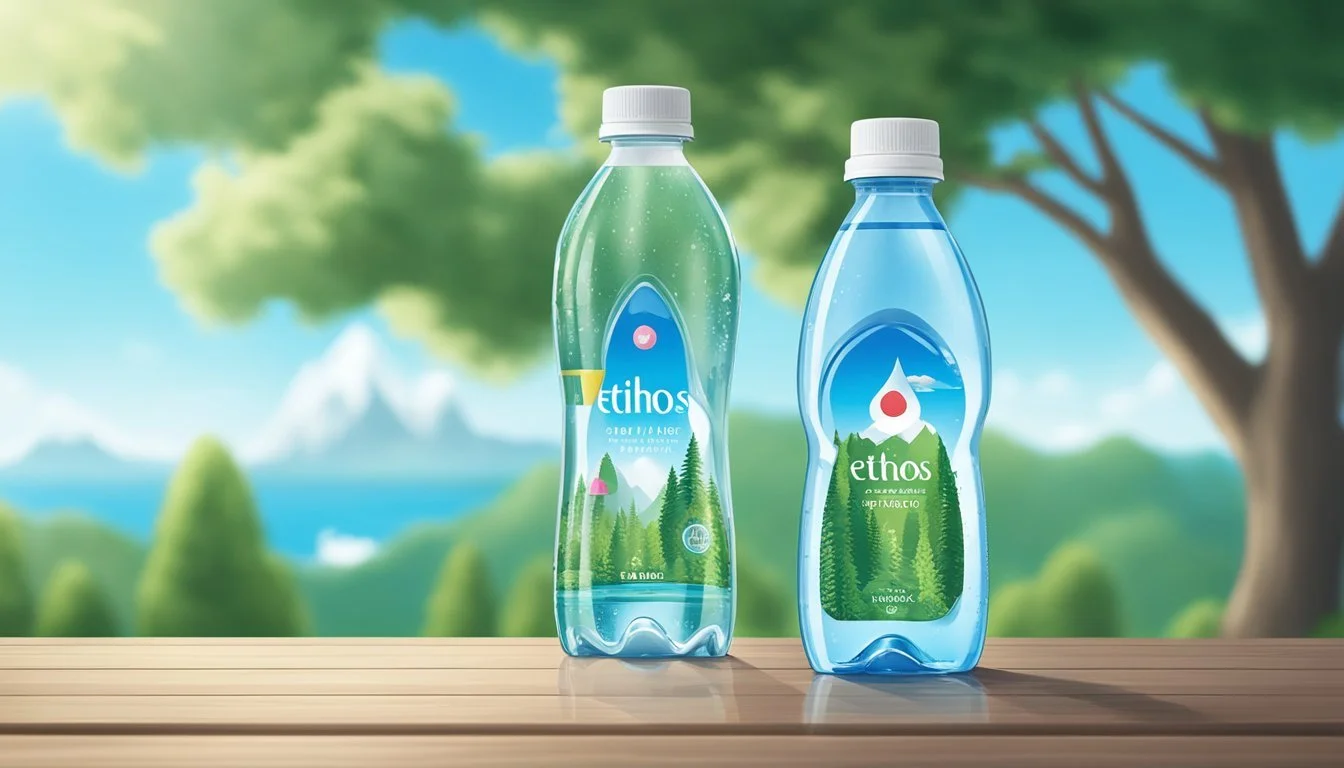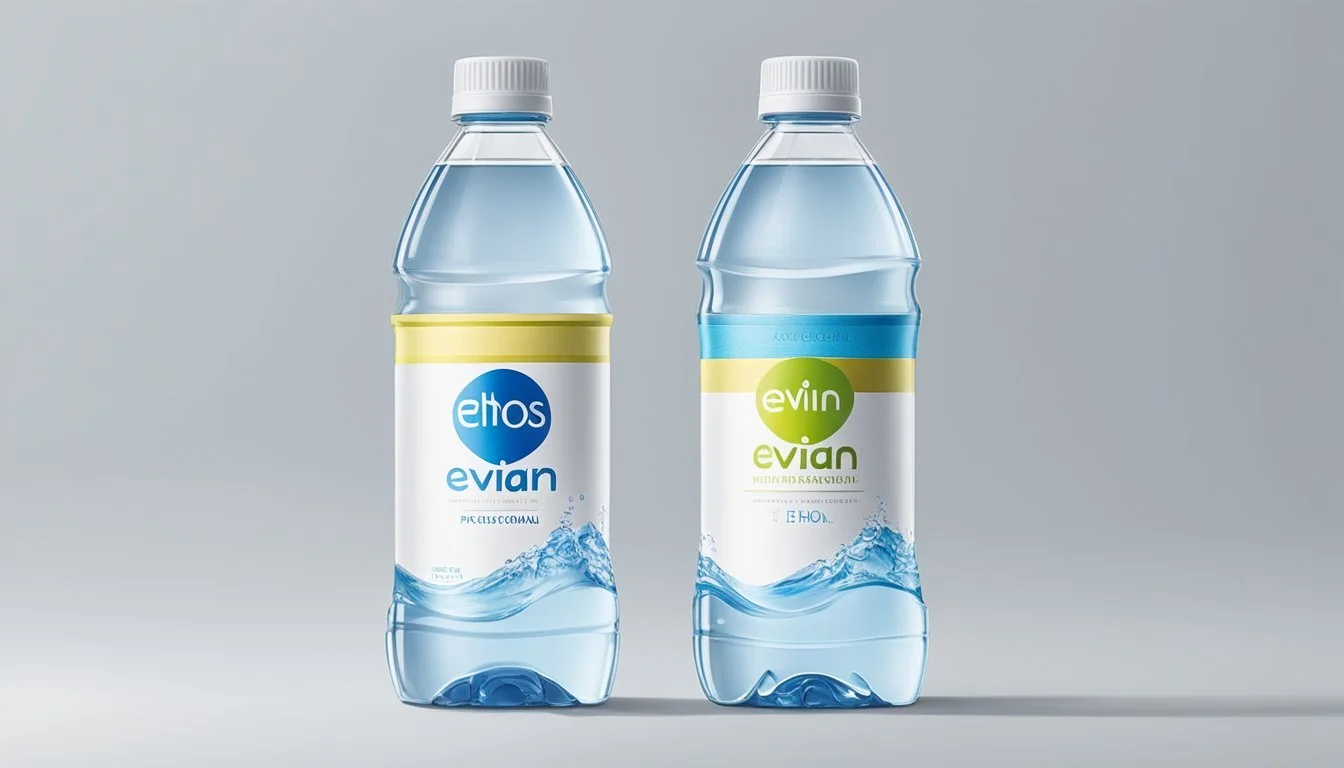Ethos vs. Evian
Comparing Quality and Taste in Bottled Water Brands
In the ever-expanding market of bottled water, two brands that often come to the forefront of consumer choice are Ethos Water and Evian. Bottled water has become a staple in many households, workspaces, and wellness routines, with considerations ranging from taste to the source and the brand's sustainability practices. Ethos, originally established with a socially responsible edge, aims to provide clean water to communities in need, while also offering a product that caters to the taste and purity preferences of the market. Meanwhile, Evian, sourced from the French Alps, carries a reputation for luxury and has long been a preferred choice for those seeking both quality and an esteemed brand name.
Comparison between Ethos and Evian goes beyond the labels and into the specifics of water quality, source authenticity, and environmental impact. Ethos Water, owned by Starbucks, pledges to donate a portion of its profits to global humanitarian water programs, blending a charitable aspect into its business model. This approach has garnered a faithful customer base that values contribution to social causes with their consumer choices. Evian's unique geological filtration process over several years contributes to its mineral composition and taste, making it a top contender in the premium bottled water segment.
A discussion on which bottled water brand is better cannot be had without weighing factors such as these. A customer's preference between Ethos and Evian may hinge on the taste, but it could also be influenced by the origin story and social responsibility ethos of the brands. As consumers become more aware of global water issues and personal health, the criteria for choosing bottled water evolve, prompting a more in-depth examination of what each brand offers.
Historical Background
Evian traces its origins to the very heart of the French Alps, a notable region that is home to pristine glacial landscapes and natural springs. The brand's history began in the late 18th century when the Marquis de Lessert experienced the waters of the Sainte Catherine spring on the land of a Mr. Cachat. The water's reputedly beneficial properties garnered attention, and by 1829, the "Société des Eaux Minérales d'Evian" was founded.
The water from Evian starts its journey as rain and snow on the peaks of the French Alps. It then travels through a natural geological filter, gaining minerals for over 15 years before emerging at the spring in Évian-les-Bains. This lengthy filtration process contributes to its mineral composition and purity, aspects that also contribute to its position in the marketplace.
Table: Evian Water Key Facts
Fact Description Source Natural springs in the French Alps Founded 1829 Filtration Over 15 years through glacial sand Location Évian-les-Bains, France Notable Property Mineral-rich, naturally occurring
In contrast, Ethos water has a different history and mission. Created in the 21st century, Ethos was established with a commitment to social responsibility, pledging to help children around the world get access to clean water. While Ethos also sells natural spring water, its emphasis is on the charitable component of their business model.
In comparison, Evian's emphasis has been on the premium aspect of their natural spring water's origin and filtration process. Each brand thus represents distinct histories and values, both contributing to their unique position within the bottled water marketplace.
Source and Production
This section provides a detailed comparison of Ethos and Evian bottled waters, focusing on their sources, production processes, and environmental practices.
Water Sources
Ethos Water sources its content from various municipal supplies, undergoing a filtration process to achieve purity. In contrast, Evian water originates from a singular source, the snow-capped peaks of the French Alps, filtered naturally through glacial sands over years before being captured from a spring.
Filtration and Purification
Ethos Water utilizes a rigorous filtration process, which includes reverse osmosis and ozonation, to ensure purity and remove contaminants. Evian's filtration process is a natural one, relying on the percolation through glacial sands that enrich the water with a balance of minerals such as calcium, magnesium, and potassium.
Bottling Process
Once purified, Ethos Water is bottled mainly in plastic water bottles, whereas Evian is available in both plastic and glass bottles. Both brands adhere to high hygienic standards during the bottling process to maintain quality and safety.
Brands and Companies
Ethos Water is a private label brand owned by Starbucks and bottled in partnership with PepsiCo. Evian is owned by the Danone Group, a company renowned for its extensive range of bottled waters.
Production Sustainability
Evian has committed to environmental initiatives, such as becoming carbon neutral by 2020 and using 100% recycled materials for its bottles by 2025. Ethos Water contributes a portion of its profits to water access programs, reflecting a different aspect of sustainability commitment.
Regulations and Standards
Both Ethos and Evian comply with stringent FDA regulations and EPA standards, ensuring their bottled waters meet or exceed required health and safety benchmarks.
Natural Composition
Evian's natural mineral taste is a result of its unique aquifer source, rich with electrolytes from volcanic rock. Ethos Water, being primarily purified water, lacks the natural composition of minerals unless added minerals are introduced.
Brand Philosophy
Ethos Water's philosophy centers on social responsibility, providing access to clean water across the globe. Evian emphasizes its connection to nature and promoting healthy hydration through naturally mineralized spring water.
Environmental Initiatives
Environmental Working Group and similar entities monitor the practices of bottled water companies. Evian has undertaken to reduce environmental impacts through eco-friendly packaging, while Ethos Water leverages its sales to fund clean water initiatives, demonstrating a direct response to environmental sustainability.
Health Considerations
When choosing between Ethos and Evian bottled waters, consumers should consider various health-related aspects such as the mineral content, safety, and hydration effectiveness.
Hydration and Health
Proper hydration is essential for maintaining health, and both Ethos and Evian water can meet hydration needs effectively. However, the presence of electrolytes and minerals in the water can enhance hydration by supporting the body's physiological processes.
Mineral Content
Evian is known for its high mineral content, including beneficial calcium and magnesium, which are important for bone health. It naturally contains these minerals, contributing to its characteristic mineral taste. Ethos water, while marketed as pure and natural water, may not offer the same level of mineral benefits.
Contaminants and Safety
Both brands adhere to safety regulations, but specific concerns about contaminants can vary. The Environmental Working Group recommends checking water quality reports for potential contaminants. Ethos claims to use a proprietary purification process that includes filtration and reverse osmosis, while Evian's natural filtration process through glacial sand also removes impurities.
Fluoridation Debate
Ethos does not add fluoride to its water; meanwhile, Evian contains naturally occurring fluoride. The debate over the addition of fluoride to water sources concerns dental health benefits versus the risk of over-exposure. Consumers should make an informed decision based on their personal health needs and preferences when it comes to fluoridation.
Hydration Technology
Ethos touts its use of a proprietary hydration technology called Hydro-7™, which it claims refines the water to ensure pure and crisp taste. Evian does not specifically advertise hydration technology but does highlight its natural origins and alkaline pH level, which some consumers believe can offer additional hydration benefits.
Calcium and Magnesium Benefits
Both calcium and magnesium are found in Evian water and contribute to the daily intake of these essential minerals. They play a pivotal role in health, contributing to muscle function, nerve transmission, and many other physiological activities. Ethos water, focusing on a pure and natural composition, also supports hydration but mineral content may differ.
Taste Profile
Choosing between Ethos and Evian bottled water often comes down to individual taste preferences. This section explores various factors that affect taste, outcomes from water taste testing, flavor variations among brands, and consumer taste preferences.
Taste Factors
When comparing bottled water like Ethos and Evian, several factors impact the perceived taste. These include the source of the water, the presence of minerals, and the processing treatments the water undergoes. Ethos water, for example, is known for its crisp taste, which can be attributed to its filtration process. Evian, sourced from the French Alps, boasts a unique mineral taste derived from the glacial sands it filters through.
Water Taste Testing
Taste testing is a common method to evaluate the flavor profile of bottled water. Tests often rank water on a scale from F-tier to S-tier, where waters like Fiji and Evian might rank higher for their clean, smooth taste with subtle mineral notes, while others like Nestle Pure Life might rank lower due to a perceived average or uninspiring taste.
Brand Flavor Variations
Most brands offer a variety of flavors or enhancements to cater to different preferences. For instance, Smartwater is vapor-distilled with electrolytes added for taste, creating a distinct profile compared to natural mineral waters. Essentia stands out with its high pH level, while Penta is notable for its ultra-purified drinking water. Core Hydration is marketed for its perfected pH that matches the body's natural pH.
Consumer Preferences
Consumer preferences can be highly subjective when it comes to bottled water. Some consumers prefer the taste of water that has a higher mineral content, associating it with a sense of purity and refreshment. Others might prefer the taste of more purified waters, which tend to have less of a distinct mineral taste. Popular bottled water brands understood this and have introduced a range of products to suit the varying tastes, such as Fiji's soft, smooth taste and Smartwater's crispness.
Environmental and Social Impact
In assessing the environmental and social repercussions of Ethos versus Evian bottled water, one must consider their carbon footprint, social engagement, commitment to sustainable packaging, and efforts to improve global water access.
Environmental Footprint
Ethos Water contributes to the ethical aspect through its pledge to help children get clean water; however, environmental impacts are significant when considering the production and disposal of plastic water bottles. A notable environmental concern is that plastic bottles, if not properly recycled, end up in landfills, taking hundreds of years to decompose and potentially harming wildlife, as exemplified by deer park pollution. Evian, on the other hand, is taking strides towards sustainability by aiming to become carbon neutral by 2020 and focusing on 100% circularity in plastic use, building on the fact that their plastic bottles are already 100% recyclable.
Social Responsibility
Ethos Water stands out in terms of social responsibility. With each purchase of Ethos Water, a portion of the proceeds is dedicated to water access initiatives. The brand has contributed millions of dollars to support water and sanitation programs in areas in need. In contrast, Evian has lesser-known social programs but emphasizes its product origin's natural purity and environmental stewardship, due in part to being sourced from the French Alps.
Packaging Alternatives
To mitigate their environmental footprint, companies offer various packaging alternatives. Boxed water solutions and glass bottles serve as more sustainable packaging options compared to conventional plastic water bottles. Glass bottles are infinitely recyclable without loss in purity or quality, and boxed water typically has a lower carbon footprint than plastic bottles. Evian has introduced a 100% recycled plastic bottle, but still, efforts are ongoing to explore other materials. The use of a reusable water bottle is often proposed to consumers as the most sustainable option, reducing waste and cutting down on the use of single-use plastics.
Water Access Initiatives
Both Ethos and Evian have implemented initiatives to address global water access issues. Ethos's mission directly focuses on this, and it has made a significant impact by funding water sanitation and hygiene education programs. Ethos Water's partnership with Starbucks has notably enhanced their funding capabilities, propelling their initiatives forward. In comparison, Evian's parent company, Danone, has participated in broad sustainability efforts, including water stewardship projects, though these initiatives are not as prominently associated with the Evian brand itself.
Consumer Convenience
When evaluating Ethos and Evian bottled waters, consumers often consider convenience factors including bottle design, market availability, and price.
Bottle Design and Functionality
Ethos Water, supported by Starbucks, offers a bottle design that emphasizes portability and user-friendliness. The bottles have an ergonomic shape, making them easy to hold and carry. In contrast, Evian's bottles are recognized for their distinct, sleek design and the fact that they are often made from recycled materials, aligning with their eco-friendly brand image. Both brands offer various sizes, catering to different needs for on-the-go hydration.
Market Availability
Evian, being one of the most popular bottled water brands globally, is readily available in many stores across diverse countries. Their wide distribution network ensures that consumers can find Evian at convenience stores, supermarkets, and even in vending machines. Ethos Water's availability is more limited, primarily found in Starbucks cafes due to the brand's partnerships and distribution strategy.
Price Comparison
When it comes to price, Ethos Water is often seen as a premium option given its association with the charitable cause of providing clean water to communities in need. Part of the sales from Ethos Water goes towards such initiatives. Evian, while also positioned as a premium product, is typically priced higher due to its reputed source and brand prestige. Here is a basic comparison of standard retail prices for a 500 ml bottle:
Brand Average Price (USD) Ethos $1.95 Evian $2.10
Note that prices can vary based on location and retailer.
Conclusion
When comparing Ethos Water and Evian, one must consider several factors. Ethos Water aims to combine philanthropy with hydration, dedicating a portion of its income to water crisis solutions. Evian, on the other hand, is renowned for its mineral-rich composition from the French Alps, offering a distinct taste and hydration experience.
Taste and Purity
Evian's natural spring water is characterized by its balanced mineral content and neutral pH, making it a favored choice for those seeking natural hydration without additional treatments or additives.
Ethical Commitment
Ethos Water's mission is to help children access clean water, thus purchasing this brand contributes to a global cause. However, this altruism does not inherently reflect the product's quality or taste.
Fiji Water
While not the primary focus of this comparison, Fiji Natural Artesian Water is another top contender in the bottled water market. Its unique mineral profile and the presence of silica give it a smooth taste that's also considered by many to be superior in the bottled water market.
In summary, the choice between Evian and Ethos largely depends on personal values and priorities. Whether one prefers the reputed taste and natural purity of Evian or supports the ethical mission of Ethos, both offer distinct benefits. For overall quality based on taste and mineral content, Evian may be considered the better bottled water for many. However, those who prioritize social impact with their purchase may lean towards Ethos Water.







